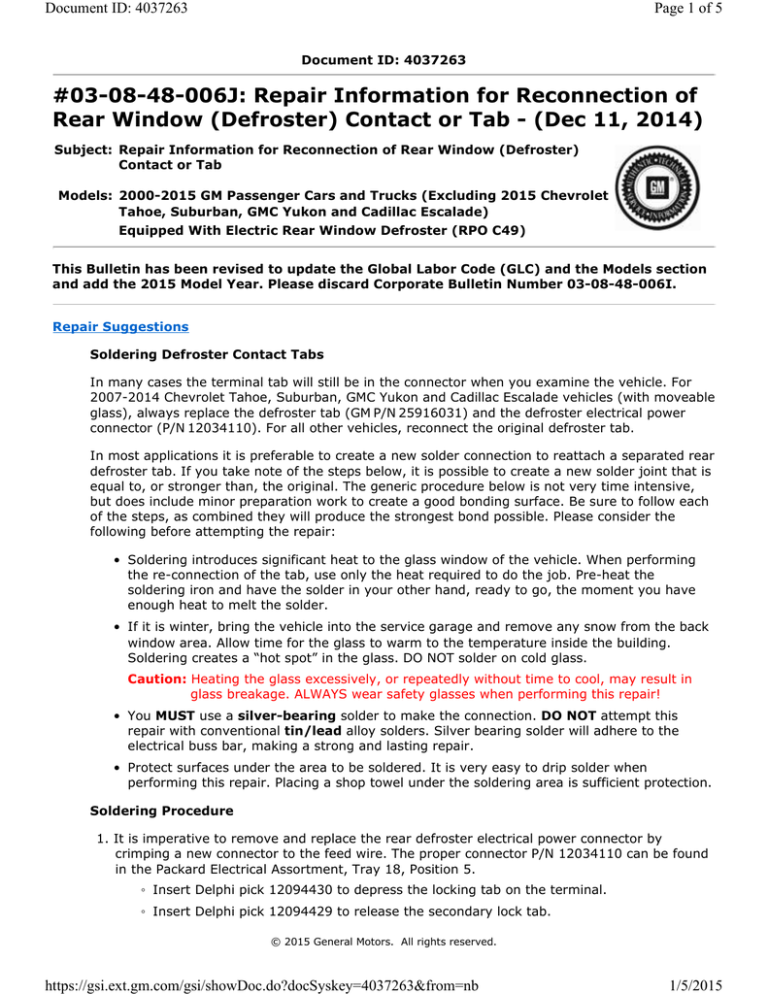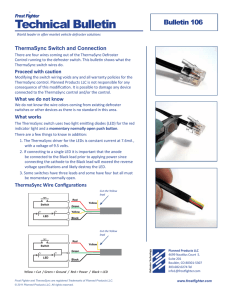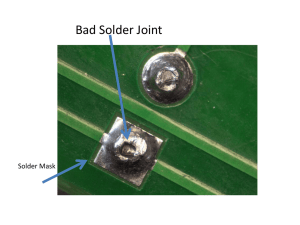
Document ID: 4037263
Page 1 of 5
Document ID: 4037263
#03-08-48-006J: Repair Information for Reconnection of
Rear Window (Defroster) Contact or Tab - (Dec 11, 2014)
Subject: Repair Information for Reconnection of Rear Window (Defroster)
Contact or Tab
Models: 2000-2015 GM Passenger Cars and Trucks (Excluding 2015 Chevrolet
Tahoe, Suburban, GMC Yukon and Cadillac Escalade)
Equipped With Electric Rear Window Defroster (RPO C49)
This Bulletin has been revised to update the Global Labor Code (GLC) and the Models section
and add the 2015 Model Year. Please discard Corporate Bulletin Number 03-08-48-006I.
Repair Suggestions
Soldering Defroster Contact Tabs
In many cases the terminal tab will still be in the connector when you examine the vehicle. For
2007-2014 Chevrolet Tahoe, Suburban, GMC Yukon and Cadillac Escalade vehicles (with moveable
glass), always replace the defroster tab (GM P/N 25916031) and the defroster electrical power
connector (P/N 12034110). For all other vehicles, reconnect the original defroster tab.
In most applications it is preferable to create a new solder connection to reattach a separated rear
defroster tab. If you take note of the steps below, it is possible to create a new solder joint that is
equal to, or stronger than, the original. The generic procedure below is not very time intensive,
but does include minor preparation work to create a good bonding surface. Be sure to follow each
of the steps, as combined they will produce the strongest bond possible. Please consider the
following before attempting the repair:
• Soldering introduces significant heat to the glass window of the vehicle. When performing
the re-connection of the tab, use only the heat required to do the job. Pre-heat the
soldering iron and have the solder in your other hand, ready to go, the moment you have
enough heat to melt the solder.
• If it is winter, bring the vehicle into the service garage and remove any snow from the back
window area. Allow time for the glass to warm to the temperature inside the building.
Soldering creates a “hot spot” in the glass. DO NOT solder on cold glass.
Caution: Heating the glass excessively, or repeatedly without time to cool, may result in
glass breakage. ALWAYS wear safety glasses when performing this repair!
• You MUST use a silver-bearing solder to make the connection. DO NOT attempt this
repair with conventional tin/lead alloy solders. Silver bearing solder will adhere to the
electrical buss bar, making a strong and lasting repair.
• Protect surfaces under the area to be soldered. It is very easy to drip solder when
performing this repair. Placing a shop towel under the soldering area is sufficient protection.
Soldering Procedure
1. It is imperative to remove and replace the rear defroster electrical power connector by
crimping a new connector to the feed wire. The proper connector P/N 12034110 can be found
in the Packard Electrical Assortment, Tray 18, Position 5.
◦ Insert Delphi pick 12094430 to depress the locking tab on the terminal.
◦ Insert Delphi pick 12094429 to release the secondary lock tab.
© 2015 General Motors. All rights reserved.
https://gsi.ext.gm.com/gsi/showDoc.do?docSyskey=4037263&from=nb
1/5/2015
Document ID: 4037263
Page 2 of 5
Important: DO NOT re-use the existing defroster tab on new-style full-size utility vehicles
with moveable glass.
2. Connect the electrical connector to the defroster tab. Fully engage the connector. An
improperly seated connector may cause excessive resistance and impede the proper operation
of the defroster. Add a small bead of solder to mate the electrical connector tab to the
defroster tab.
3. Prepare the surface of the used defroster tab (not required for new tabs on new-style full-size
utility models) and the defroster buss bar with fine grain (500 grit) sandpaper or Emery cloth.
It is not necessary to remove all of the original solder, but it should be scuffed sufficiently so
that no oxidation is present. The photo above shows a close up of a properly prepared
surface.
Tip: You may want to mask the glass around the contact area with tape. This is easy to do
and will allow you to safely prepare the contact surface without the risk of scratching the
glass or the black painted shading.
Important: Most rear glass has a black painted masking around the edge of the glass. When
cleaning up the connection surface, be very careful not to damage the surface of
the black shading or the surface of the glass.
4. Wipe the newly prepared contact area with Kent Automotive* Acrysol™ (or equivalent) to
remove any residual oil or dirt.
https://gsi.ext.gm.com/gsi/showDoc.do?docSyskey=4037263&from=nb
1/5/2015
Document ID: 4037263
Page 3 of 5
Important: You MUST use a silver-bearing solder to make the solder joint. DO NOT
attempt this repair with conventional tin/lead alloy solders. Most suppliers have
this type of solder available and it is available nationally at Radio Shack® (U.S.)
or The Source® (Canada).* It is sold in several diameters and either are
acceptable for this repair.
5. For this step, it is permitted that two technicians be used if required. Heat the new connector
on the surface of the buss bar that is to be soldered. Long nose pliers are suggested to hold
the electrical connector and the defroster tab in place. Keep the solder ready and begin
flowing out the solder as soon as the melting temperature has been reached.
Tip: If a single technician is attempting this repair, it is beneficial to wrap one turn of the
solder around the new contacts base. In this manner, as the melting point of the solder is
reached, a layer is deposited on the bottom side of the contact.
Important: Try to align the new contact so that it is positioned with the same orientation as
the original contact.
https://gsi.ext.gm.com/gsi/showDoc.do?docSyskey=4037263&from=nb
1/5/2015
Document ID: 4037263
Page 4 of 5
6. The above illustrates an ideal finished solder joint. Additional stray solder will not harm the
performance of the bond; however, while it is unlikely that customers may refer to the
appearance of the rear window defroster and its components as a positive styling feature of
the vehicle interior, it is easy to elicit the opposite reaction due to a poor cosmetic application.
*We believe this source and their products to be reliable. There may be additional manufacturers
of such products/materials. General Motors does not endorse, indicate any preference for, or
assume any responsibility for the products or material from this firm or for any such items that
may be available from other sources.
Parts Information
Acrysol™ can be ordered directly from Kent Automotive at 1-800-654-6333 (in Canada, 1-800563-1717).
Radio Shack® products can be found nationally at retail locations, www.radioshack.com, or at 1800-843-7422 (The Source® in Canada, www.thesource.ca, or at 1-866-454-4426).
All other parts can be ordered through CC&A.
Part Number
Description
25916031
Tab, Defroster Power (2007-2014 full-size utility models)
12034110 (Tray 18,
Position 5)
Rear Defroster Electrical Power Connector (Packard Electrical
Assortment Only)
64-013*
Radio Shack® (The Source® in Canada) Silver Solder (0.022”
dia)
64-026*
Radio Shack® (U.S Only) Silver Solder (0.062” dia)
P20005*
Kent Automotive Acrysol™ Solvent (32 fl oz) 946 ml
12377900* (U.S.)
10953529 (Canada)
GM Vehicle Care Dielectric Lubricant (2 fl oz)
https://gsi.ext.gm.com/gsi/showDoc.do?docSyskey=4037263&from=nb
1/5/2015
Document ID: 4037263
Page 5 of 5
Part Number
Description
*or equivalent product
Warranty Information
For vehicles repaired under warranty, use:
Labor Operation
Description
Labor Time
2080398*
Defroster, Electrical Connection – Reattach
0.3 hr
*This is a unique Labor Operation for Bulletin use only. It will not be published in the Labor
Time Guide.
GM bulletins are intended for use by professional technicians, NOT a "do-it-yourselfer". They are written to inform these
technicians of conditions that may occur on some vehicles, or to provide information that could assist in the proper service of a
vehicle. Properly trained technicians have the equipment, tools, safety instructions, and know-how to do a job properly and
safely. If a condition is described, DO NOT assume that the bulletin applies to your vehicle, or that your vehicle will have that
condition. See your GM dealer for information on whether your vehicle may benefit from the information.
https://gsi.ext.gm.com/gsi/showDoc.do?docSyskey=4037263&from=nb
WE SUPPORT
VOLUNTARY
TECHNICIAN
CERTIFICATION
1/5/2015


